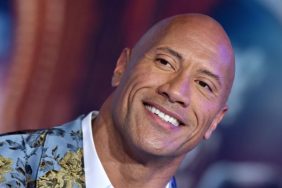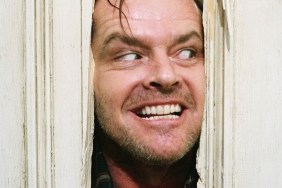You may have heard the theories, which claim that man has never walked on the moon. That on the day Neil Armstrong and Buzz Aldrin landed on the moon – on July 21, 1969 – the footage we saw was actually of a soundstage, using visual effects similar to those in Stanley Kubrick’s 2001: A Space Odyssey. You may have even heard that Stanley Kubrick himself was directly involved.
It’s bunk, of course: third party evidence exists to disprove the hypothesis but the concept is so fascinating that filmmaker Matt Johnson (The Dirties) decided to mount an ambitious motion picture about it. Starring Matt Johnson and Owen Williams (as mid-20th century versions of themselves), Operation Avalanche tells the story of two A/V geeks at the CIA who go undercover at NASA, learn that a moon landing is impossible, and formulate an unthinkable plan to fake the phenomenal event as a work of propaganda.
Also: SXSW 2016 Exclusive | Listen to the Soundtrack to ‘Operator’
Operation Avalanche plays at the SXSW 2016 Film Festival this year, and we got Matt Johnson on the phone in the days preceding the event to talk about why the conspiracy theories persist and how he managed to film himself interacting with Stanley Kubrick on such a small budget. We also spoke about low budget car chases and taking on more than you can handle.

Lionsgate
Crave: What do you think our cultural obsession is with whether or not the moon landings were faked? Where do you think that comes from?
Matt Johnson: Well, I think it comes from actually a very American place. I mean, I’m a Canadian but it just seems like there is a kind of rebel culture to Americans – and actually North Americans, I’ll include Canada as well – in thinking that they know better than the institutions that govern them. I think you see a lot of that in the election right now. There’s a huge, huge anti-government of people who think that just they know better, or that there’s something going on that isn’t what they’re being told, and that’s a much sexier idea than “hard work pays off.” I think everybody thinks that.
So with the moon landing – arguably the greatest American achievement of all time from a certain, sort of superficial point of view – it’s very easy to think, “Oh yeah, they faked it.” It’s also a lot more fun to think that they faked it. Mind you, me and none of the people who made this movie believe in any way, shape or form that the moon landing was faked. Not even a bit. I think that probably comes across in the film. […] We think that’s ridiculous.
Actually it raises the question, how much of the conspiracy theory that you concoct in Operation Avalanche came from you guys? Or did you get this all from a really detailed LiveJournal post somewhere?
That’s a great question and we tried to be as smart as we could about that, because as kooky as a theory is, there are some very, very smart people who have put a lot of work into figuring out how the moon landing could have been faked. Three of them specifically, we sort of took a combined vision of their chains of events into what would have had to have happened to fake the moon landing, and that’s what you’re watching.
So a lot of that was us really trying to create this footage and stumbled into solutions that we came up with doing it, but our base, what were were starting with, was sort of the conspiracy theory of three very prominent, kind of crazy conspiracy theorists. Like, the authorities on the moon landing, they’d say. We just sort of stole… I think you see a lot of it. Like we hide it as much as we can because I don’t think that’s interesting to sort of a general audience. I don’t think they really care about the details about the conspiracy but we’re trying to put all those things in there for those conspiracy people who are going to be like, “Oh wow! Yeah! I knew that! That rock was labeled ‘C!’”
“Me and none of the people who made this movie believe in any way, shape or form that the moon landing was faked.”
Tell me about the Stanley Kubrick scene. You get to go to the set of 2001: A Space Odyssey and meet Stanley Kubrick. Was that just a really good body double?
No, that’s really Stanley Kubrick. That actually is like living, breathing Stanley Kubrick and that entire sequence was built by the best VFX artist I think working in the country of Canada. He completely conceived and proposed an entire 2001 sequence from the ground up using a combination of unreleased Stanley Kubrick footage, a whole bunch of old very high-res photographs and then a ton of time in both the actual 2001 set in England and the green screen studio in Toronto.
That’s impressive. How did you get the okay for that? Did you go through the studio or did you have to go through Stanley Kubrick’s family?
Well it was a bit of both. We didn’t go through the studio to get any of that footage because the studio didn’t own that footage that we used. We used like an archive, a huge archive in the U.K., When I was there for the movie The Dirties we went to the massive Stanley Kubrick archive and tried to find footage that people hadn’t seen before, that was the highest res possible, and that’s what we used. And most of the footage that you’re watching, that you’re just thinking “How did they clear that,” we used legal Fair Use to use. So it’s almost like we were using it almost as journalists, in a sense.
Was it always part of the script that you were going to do that, or were going to concoct some other way around it if you couldn’t get the rights to that footage?
No, no, no, we were confident that we were going to use Stanley Kubrick. Like, you can tell right from the very first frame these are two guys obsessed with Stanley Kubrick. Maybe not so much Owen, but Matt is such a cinephile and so much in the era. We wanted to make a love letter to Dr. Strangelove, which is my favorite movie ever made. So we knew Kubrick had to be a part of it. How exactly we were going to do that we didn’t know.
I mean, I understand what you’re asking. You’re asking me if I couldn’t have done that scene with Stanley Kubrick what would we have done. And the answer is I would have just figured out a way to imply that Stanley Kubrick got that stuff, or that we stole this stuff from his set or whatever. I would have found another solution to it. It just so happens that I got the best possible version of it from a very talented artist.

Lionsgate
I want to talk about something but I don’t want to ruin it for people, since I know they’re not going to get to see the film for a little while. But I was very impressed by how you put together a found footage car chase.
Yeah, that was something that right from the very beginning got me interested in making this movie because I’d never seen something like that before. And again, I liked the abrupt change in tone because it’s very hard to not only pitch movies like this but to develop them. It’s like we’re trying to make a documentary that at all levels follows the rules of what an actual documentary would do. Our big basis was the television series American Family, that was sort of what we were coming from, and also that documentary Maysles documentary Gimme Shelter. Those were sort of what we were looking to try to do, except in NASA.
So I thought it would be crazy to put a character in a situation where not only is he being chased for his life but that it makes sense for the cameraman to be capturing it because that story is in fact the thing that is going to protect them in the end, from the people trying to kill them. But it was just such an interesting space. The actual technical challenge of doing something that way, that I had never seen before, and that our whole team was really struggling to figure out how to do, was also a great challenge.
Because that’s the kind of stuff that independent film can do that big Hollywood movies just can’t, right? No way, there’s no way you could have put a bonded actor in the situation that I put myself and the cameraman in. It would never happen legally.
Was it all one shot, or is there fakery in there, or do you not want to give away the “magic?”
Obviously, I think there are some very clear effects. I mean that guy’s not shooting a real gun at me. That stuff… we used real guns in our last movie and we realized that we can’t do that in this movie, it would be too dangerous. But other than that, no, what you see is what you get. That’s just a stunt driver chasing me and I’m just driving away. That’s it. We didn’t have any money so how else could we have done it? We had to shoot it the way you see it.
“In order to do it we had to go undercover at NASA, pretending to make a documentary.”
You mentioned something about how you pitch a movie like this, and it occurs to me that, in a way, this entire movie is about a pitch. It’s about pitching an idea, having a clever pitch, and then “Oh crap, we have to follow through!”
No doubt, and it’s so funny because what you’re touching on is really the resonance between real Matt and fake Matt, which to me is the juiciest part of making a movie this way. Which is that I find that if I put myself and my team in as close an approximation to the situation in the story that we’re in in real life, that the stuff just writes itself.
So yeah, I pitched an impossible movie with a crazy idea that seemed like it could never get done for this budget, the exact same way that the character in the movie pitches an impossible idea. Not only that but he has absolutely no expertise in doing this thing and yet he acts like he does, which is the exact same thing that we did.
And not only that but in order to do it we had to go undercover at NASA, pretending to make a documentary, which we had to do in real life. So as many times as you can get life mirroring what you’re trying to have happen in the film – this is just from my experience – the easier it is to have it all come together. Because then you’re not fighting. It’s sort of a one-to-one relationship between reality and what you’re shooting.
So you basically snuck into NASA under false pretenses in real life, is what you’re saying?
Yeah.
Has NASA called foul on that? Have they at least sent you an email saying, “Hey, what the hell?”
Not yet but I mean, the movie really hasn’t kind of come out of the gates yet. I imagine when it’s released they may have something to say, but NASA is a huge organization, right? I mean, they employ like millions and millions and millions of dollars worth of salaried employees who are all responsible for very important things, so a movie like this I don’t think they really care about at all. [Laughs.] If anything I think it’s good for raising awareness of NASA and what they do. My hope is that the people in the film and the people from NASA who see the movie will actually really like it.
William Bibbiani (everyone calls him ‘Bibbs’) is Crave’s film content editor and critic. You can hear him every week on The B-Movies Podcast and watch him on the weekly YouTube series Most Craved and What the Flick. Follow his rantings on Twitter at @WilliamBibbiani.
10 Must-See Films at SXSW 2016
Top Photo: Lionsgate
10 SXSW 2016 Movies You Need To See
-
Beware the Slenderman

Irene Taylor Brodsky directs a documentary feature about the curious internet phenomenon of The Slenderman, an internet meme created in 2009... and the two girls who committed murder for him.
Image: HBO
-
Born to be Blue

In Robert Budreau's new biopic, Ethan Hawke plays the turbulent jazz genius Chet Baker.
Image: IFC Films
-
Collective:unconscious

A collective of five indie filmmakers take turns adapting one another's dreams to film.
Image: SXSW
-
Everybody Wants Some

Richard Linlater's love story to the fashions and joys of youth in the early 1980s is being credited as a "spitirual sequel" to his Dazed and Confused.
Image: Paramount
-
In a Valley of Violence

A town of oddballs become the site of a revenge plot. Ethan Hawke stars, and indie horror master Ti West directs.
Image: Focus World
-
Karaoke Crazies

A bizarre-looking Korean musical about a failing karaoke house, the video game addict girl that saves it, and a serial killer on the loose.
Image: SXSW
-
Pee-wee's Big Holiday

The decades-anticipated follow-up to Big-Top Pee-wee follows our eponymous manchild on his first-ever vacation.
Image: Netflix
-
Phantasm REMASTERED

The 1979 cult classic starring a tall mortician and a bevvy of interdimensional imps has been meticulously restored by J.J. Abrams. This may be your only chance to see it on the big screen.
Image: AVCO Embassy
-
The Liberators

A documentary film by Cassie Hay, The Liberators is about the investigation behind a clutch of missing Nazi gold, and its ultimate discovery in a small Texas town.
Image: SXSW
-
Doug Benson interrupts Leprechaun 4

Comedian Doug Benson has an ongoing cinematic series wherein he controls when a film stops and starts so that he may give his own hilarious commentary. In honor of St. Patrick's Day, he will be interrupting Brian Trenchard-Smith's amazing weird-fest Leprechaun 4: In Space.
Image: TriMark








